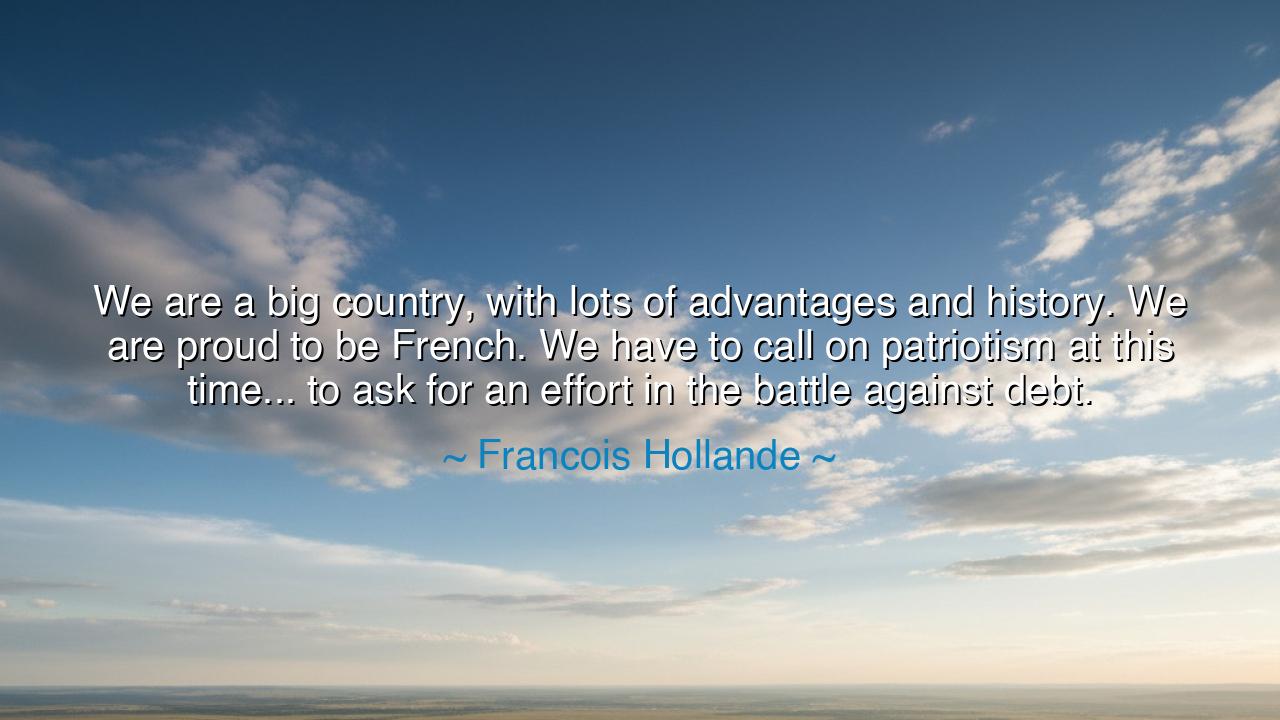
We are a big country, with lots of advantages and history. We
We are a big country, with lots of advantages and history. We are proud to be French. We have to call on patriotism at this time... to ask for an effort in the battle against debt.






“We are a big country, with lots of advantages and history. We are proud to be French. We have to call on patriotism at this time… to ask for an effort in the battle against debt.” Thus declared François Hollande, President of France, in a moment when the nation faced not the drums of war, but the heavy burden of economic struggle. In these words, he invokes not only pride in history and the grandeur of France, but the deeper power of patriotism—the strength that calls people to sacrifice for the common good, not only on the battlefield, but also in times of hardship, debt, and rebuilding.
The origin of this saying rests in France’s long tradition of linking patriotism with duty. The French people have known great trials—revolutions, wars, occupations, and crises—and in each, their leaders summoned them to unity. Hollande’s words continue that tradition, but in a modern battlefield: the economy. For just as soldiers once defended the land with their lives, citizens were now asked to defend their nation’s future through shared responsibility, discipline, and effort against the creeping weight of debt.
History reveals many such moments when a nation’s greatness was tested not in battle, but in sacrifice of another kind. Recall the Britain of World War II, where citizens endured rationing, blackouts, and shortages. Their patriotism was not only in cheering the soldiers, but in standing patiently in queues, growing gardens, and making do with little. By enduring these burdens together, they kept their country alive. In the same way, Hollande’s call to France was a reminder that patriotism must sometimes wear the cloak of restraint and endurance, rather than that of glory.
France, in particular, holds a unique legacy of history and identity. From the Revolution that declared liberty, equality, and fraternity, to the resistance that defied Nazi occupation, the French spirit has long been bound to sacrifice for principle. Hollande’s invocation of this spirit was no empty phrase—it was an appeal to the memory of generations who had suffered, endured, and triumphed. To be “proud to be French” was not mere sentiment, but a reminder of the duty each citizen bore to uphold the dignity and strength of their homeland, even in the quieter wars of finance and policy.
Yet his words also contain wisdom for all peoples: that patriotism is not only in moments of triumph, nor only in the roar of armies. True patriotism is revealed when a people accept burdens together, when they do not shrink from duty because it lacks glory, when they see that their sacrifices build the foundation for future generations. In asking his people to unite against debt, Hollande was calling them to defend not only their present, but their children’s tomorrow.
The lesson for future generations is this: never think that loyalty to your country is measured only in great wars and parades. It is measured also in the quiet struggles, the unheralded sacrifices, and the collective endurance that keeps a nation strong. A people’s greatness is proved not only by what they conquer, but also by what they preserve. Patriotism, rightly understood, is the willingness to bear the burdens of the present for the sake of the nation’s enduring life.
Practical actions flow from this wisdom: work diligently, even when your labor feels small; bear the necessary burdens with pride, for they are contributions to the whole; live frugally when your nation demands it, and generously when your neighbor needs it. Speak often of pride in your homeland, but prove it most of all in the discipline of your life. In so doing, you embody the truth of Hollande’s call: that a nation’s survival is not only in its victories, but in the resilience of its people.
So let his words endure: “We are proud to be French… we have to call on patriotism at this time.” Remember always that patriotism is not only a flag waved in triumph, but a shield raised in struggle. And may all peoples learn that when sacrifice is borne together, even in times of scarcity, the nation emerges not diminished, but renewed in spirit and in strength.






AAdministratorAdministrator
Welcome, honored guests. Please leave a comment, we will respond soon